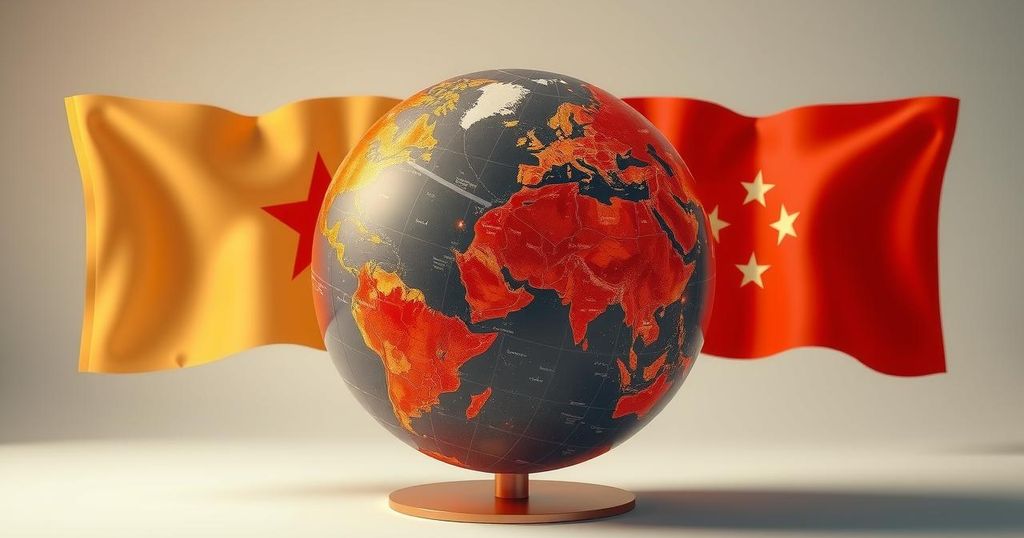Trump’s Silence on Garcia’s Return Raises Legal and Ethical Questions

President Trump has not spoken to El Salvadoran President Nayib Bukele about the return of Kilmar Abrego Garcia, a man mistakenly deported from Maryland. The situation has raised legal and ethical questions regarding immigration policy and due process rights. Recent court orders mandate that Garcia’s case is expedited, while public opinion remains divided on the administration’s immigration actions.
In a recent statement, President Donald Trump indicated he has not communicated with El Salvadoran President Nayib Bukele regarding the return of Kilmar Abrego Garcia, a man who was mistakenly deported from Maryland. At the White House, Trump responded to questions, asserting, “I don’t know. I haven’t spoken to him.” He delegated discussions on the matter to legal counsel, emphasizing his distance from the decision-making process.
In a Tuesday interview with ABC News, Trump claimed that returning Abrego Garcia with a simple phone call was feasible, yet he refrained from taking any action, despite the Supreme Court’s April 10 directive for his administration to facilitate the man’s release. According to Trump’s administration, only El Salvador possesses the authority to act on the matter. Trump noted Bukele’s earlier statement, made during an April 14 meeting, where the president of El Salvador expressed his unwillingness to return Garcia.
Confusion surrounds the situation as reports emerged about interactions between U.S. Secretary of State Marco Rubio and Bukele regarding Garcia’s case. A note from U.S. diplomats was reportedly sent to Salvadoran officials, but the Bukele administration denied the request for Garcia’s return. During a Cabinet meeting, Rubio declined to elaborate on any communications, emphasizing the importance of foreign policy remaining under the President’s purview.
Requests for comments from the U.S. Department of Homeland Security and El Salvador’s office were not returned regarding these reported communications. Meanwhile, the U.S. District Court in Maryland has expedited discovery in Garcia’s case, mandating that proceedings be wrapped up by mid-May.
Garcia, 29, was living in Maryland with a work permit when he was detained in March by immigration officials who questioned him regarding supposed gang affiliations. This occurred despite existing legal protections enabling him to remain in the United States. His deportation included three flights, one of which contained Venezuelan migrants. Critics point out the potential risks posed to constitutional due process rights as a result of the Trump administration’s actions.
Legal representatives for Garcia firmly deny any connections to criminal gangs, asserting that he fled violence in El Salvador as a teenager. They highlight a protective order secured in 2019 that permits Garcia to live in the U.S. In a statement, Senator Chris Van Hollen remarked, “If Donald Trump can ignore court orders and trample over the rights of one man, he threatens the rights of everyone who lives in the United States of America.”
President Trump has continued to advocate for his immigration policies as he marks his 100th day in office. Public opinion appears divided; while Trump garners strong support for immigration enforcement, recent polling shows many Americans favor the return of Garcia. Additionally, advocates for other migrants who were part of the March deportation flights are pushing courts to facilitate their return from El Salvador.
In further developments, Rubio disclosed that the Trump administration is in discussions with other nations about the acceptance of deported migrants, following a previously announced arrangement with Uzbekistan. A separate court ruling today ordered the administration to adhere to due process standards for migrants held at Guantanamo Bay.
The situation surrounding Kilmar Abrego Garcia encapsulates broader tensions and debates surrounding immigration policies and the limits of executive power, as legal and ethical questions continue to emerge.
In summary, President Trump’s lack of communication with El Salvadoran President Bukele regarding Kilmar Abrego Garcia’s return underlines the tensions within U.S. immigration policy. The Supreme Court’s involvement raises critical issues about executive compliance with judicial orders. Amid divided public opinion, the administration’s actions reflect ongoing debates about due process and migrant rights. Furthermore, the Trump administration’s international approach to handling migrants adds another layer of complexity to the already contentious immigration landscape. Despite the assertion of executive authority by Rubio, ongoing legal scrutiny and public pushback may influence future decisions surrounding expulsions and returns of deported individuals.
Original Source: www.staradvertiser.com








